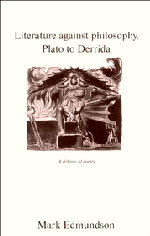1 - Rhetorics of blindness
Published online by Cambridge University Press: 03 May 2011
Summary
And the question is still what it was then, how to view scholarship from the vantage of the artist and art from the vantage of life.
NietzschePerhaps the most surprising turn in William Wordsworth's “Intimations” ode comes when the poet calls the child, the object of his broodings throughout the poem, the “best Philosopher”:
Thou, whose exterior semblance doth belie
Thy Soul's immensity;
Thou best Philosopher, who yet dost keep
Thy heritage, thou Eye among the blind,
That, deaf and silent, read'st the eternal deep,
Haunted for ever by the eternal mind, -
(109-14)Wordsworth's friend, collaborator, and sometimes competitor, Samuel Taylor Coleridge, disliked this passage intensely, citing it in his Biographia Literaria as a salient instance of “mental bombast”: “a disproportion of thought to the circumstance and occasion. ”What Coleridge denounces as bombast, I take to be one of Wordsworth's best moments as a poet, a moment that, read in its larger implications, can bring one to profitable reflections on the contemporary limitations of academic literary criticism, as well as its future promise.
To put it simply, my contention in this chapter will be that criticism has followed the spirit Coleridge evinces in the judgment when it should have been attending just as much, if not more, to Wordsworth's achievement. There are material as well as intellectual issues involved in criticism's implicitly following Coleridge's verdict on the philosopher/child, and those too will need exploration.
- Type
- Chapter
- Information
- Literature against Philosophy, Plato to DerridaA Defence of Poetry, pp. 30 - 66Publisher: Cambridge University PressPrint publication year: 1995



